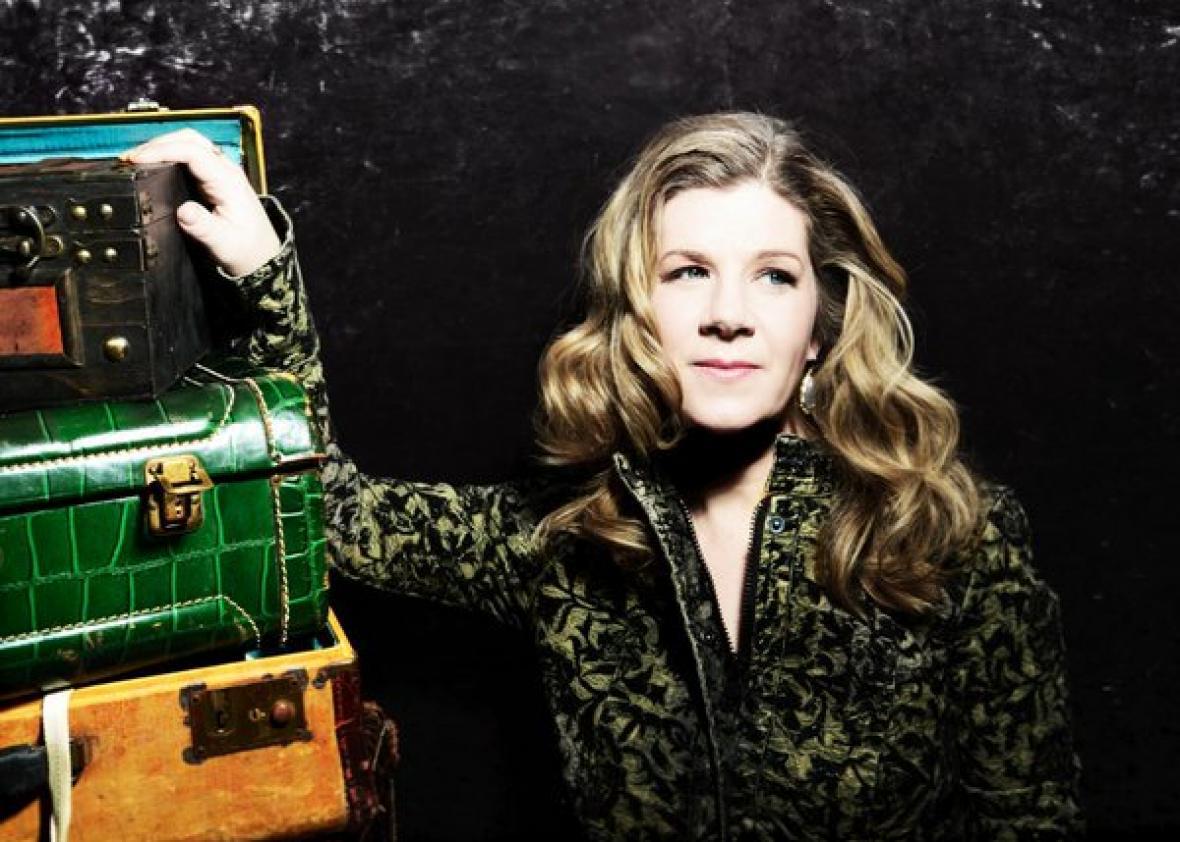When Dar Williams first wrote the song “The Christians and the Pagans,” about a solstice-celebrating lesbian couple who visit devout Christian relatives during Yuletide, she intended the folk-pop tune to be a humorous respite from tortured holiday gatherings. “The food was great, the tree plugged in, the meal had gone without a hitch/ Till Timmy turned to Amber and said, ‘Is it true that you’re a witch?’ ”
Filled with similarly wry lines, the song, an audience favorite since Williams recorded it on her 1996 album Mortal City, nevertheless evokes rumination on fractured families and societal ills in listeners, some of whom drill deeply into the psychology of the lyrics. The acoustic-based singer, who will perform the song at her annual concert, “Christians, Pagans and Other Hipsters,” Dec. 26 at the Bell House in Brooklyn, remembers one such devotee, a high-school boy, who came backstage after a concert. He had just attended a rally in response to a gay bashing and said he was deeply moved by the reference to a lesbian couple in the song. “To hear this song today, I just can’t stop crying,” Williams recalled him saying.
Nowadays, with queer anthems topping the pop charts, it may be difficult to understand the deep emotion behind that response. Williams, 48, has lived through that evolution, having been a pioneer of sorts at writing lyrics that countered entrenched notions of gender and sexuality. “A lot of my career success came because I was in communities where people were ahead of the curve with gender exploration,” said Williams, who toured tiny coffeehouses while attending Wesleyan University in the mid-’80s. She later lived in Northampton, Massachusetts, a liberal enclave, which, like many such neighborhoods of the time, did its share of questioning societal roles. “Northampton, where the women are strong and the men are defensive,” she used to joke.
Williams, who released Emerald, her ninth CD, in May 2015, “came out as straight” more than a decade into her career, having been assumed by many fans—perhaps with some wish fulfillment involved—to be a lesbian. Her relationship songs have typically avoided gender pronouns, and she has regularly performed with the likes of Ani DiFranco and the Indigo Girls.
Her song “When I Was a Boy” has evolved into a trans anthem of sorts, with lines such as, “I was a kid that you would like/ Just a small boy on her bike/ Riding topless, yeah/ I never cared who saw.” Williams concedes that those lyrics were originally inspired by self-proclaimed misunderstood straight men she met in college. “I found myself in many conversations with guys, often in a bar, when they would say, ‘I’m not like other men.’ I just saw a loneliness there that I wanted to write about.” Of the trans women and men who see themselves in the song, Williams says, “There was a lot of permission in that song that people took and that I hadn’t even intended, which is fabulous.”
“Hang on.” Williams suddenly interrupts our phone conversation to answer her 6-year-old daughter, Taya, burbling in the background. “That’s a mango, honey. You don’t want a mango? OK, you can have yogurt.”
For those of us in Williams’ generation who grew up eating condensed soup and macaroni and cheese, this bit of conversation only reinforces her famous championing of all things healthy and green. A longtime environmentalist who co-authored a book called The Tofu Tollbooth, Williams also works with kids in summer camps to plant bee-friendly gardens. The cover of End of the Summer, her 1997 CD, features a photo of Williams literally in the woods, her arms caked in mud. It doesn’t get much more earthy.
Williams is currently at work on a book about the many communities she’s visited while touring across the country. She cites conservative tycoon Roger Ailes, a fellow resident of Garrison, New York, as something of an unlikely inspiration. “He coined the political phrase ‘red state/blue state’—the idea of division and a constant unproductive clashing,” said Williams, whose travels made her take note of the productivity of small-town politics. “There’s the narrative that people in American towns don’t get along—that local politics are so messy and horrible. Well, they are kind of messy and horrible,” she said, “But they’re incredibly successful, too.”
It makes perfect sense that Williams, who has dedicated much of her career to rumination on identity politics, would now turn to a book focusing more outwardly on community. “We’re in a post-Aquarian world. We’re skeptical about love and harmony as the guiding principles of community building,” she said of the Gen X generation.
Members of that generation will be at her concert on Saturday, likely hoping for a break from the holiday glare. “We usually have the show a couple days after Christmas, when you’ve either survived Christmas or the fact that you don’t celebrate Christmas. It’s a huge exhale,” she said.
